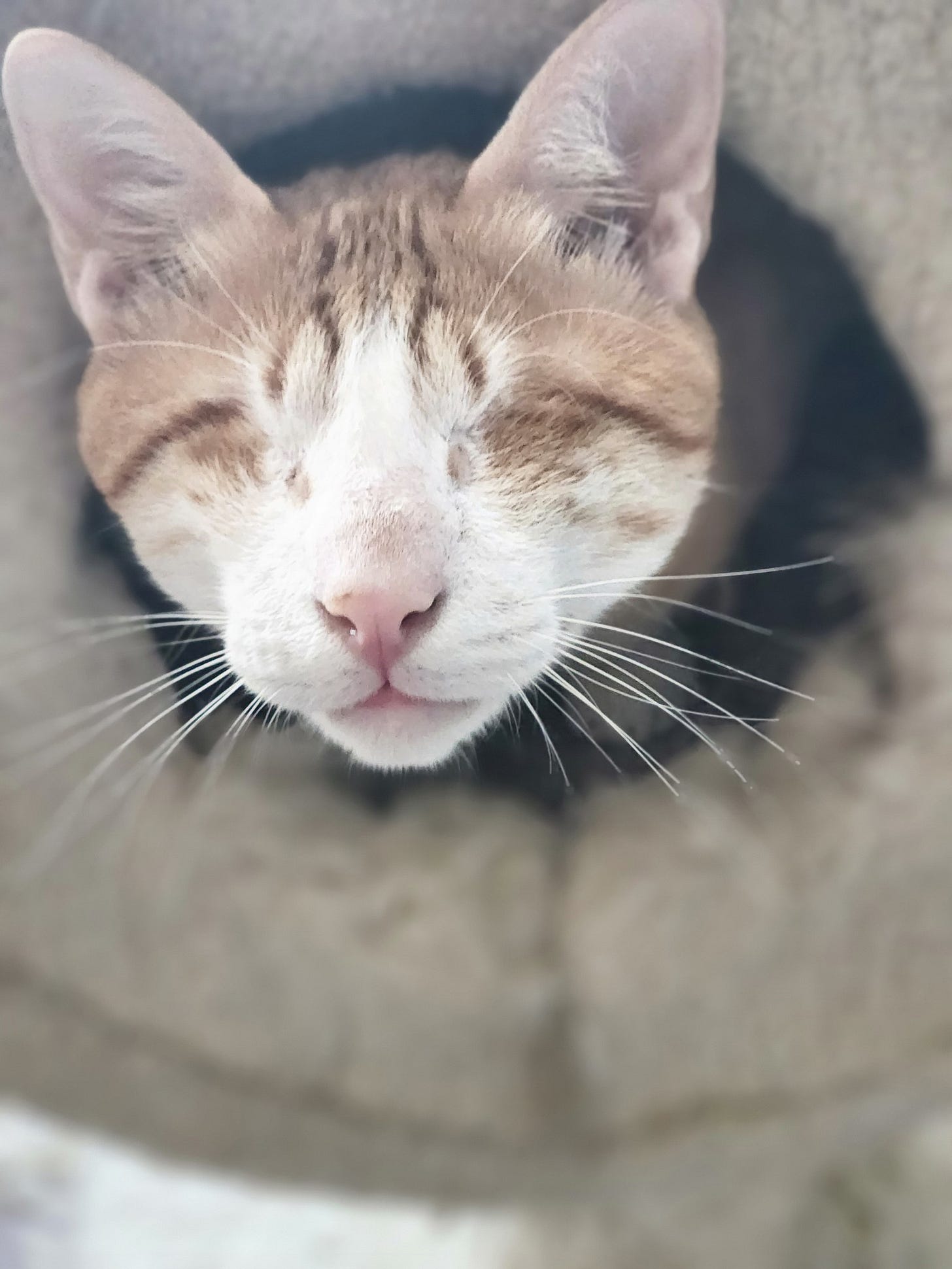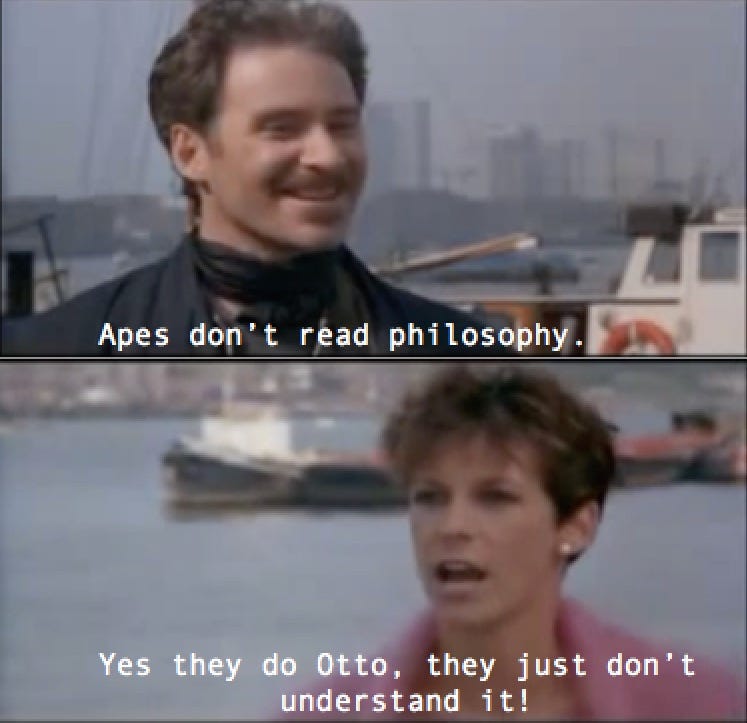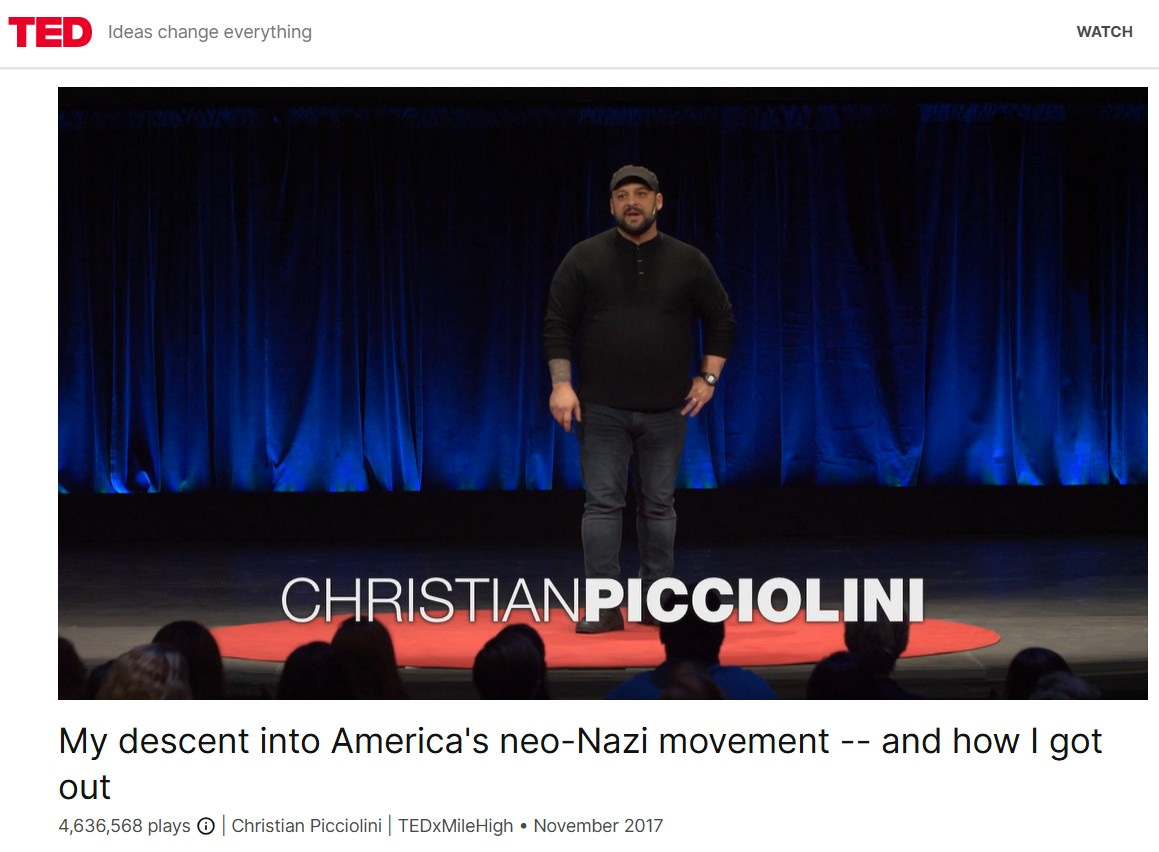How to Remain Whole while Confronting Hate
"He who fights with monsters might take care lest he thereby become a monster." - Friedrich Nietzsche
The above quote from Nietzsche speaks to the importance of maintaining one’s humanity when confronting great evil. It immediately precedes the more well-traveled notion: “If you gaze long into an abyss, the abyss gazes also into you.”
These observations are potent reminders of the degradation of self we may suffer and the moral hazards we may incur when living under and struggling against an authoritarian regime.
I am not, nor will I pretend to be, a student of philosophy, but I am able to remember a good quote, and an internet search engine can do the rest. My inclinations lean more toward popular culture than philosophy. As such, my introduction to Nietzsche came in the form of malevolent buffoon, Otto West, played hilariously by Kevin Kline in the 1988 film, A Fish Called Wanda.
What, you may ask, do an Academy Award-winning 20th-century actor and a 19th-century nihilistic German philosopher have to do with my life in the age of President He-who-shall-not-be-named?
Kline is here for the humor, obvs, but Nietzsche came to make a relevant point.
I’ve been asked a few times how I find it possible to Lead with Love—how I can try to extend grace and understanding toward persons who promote, support, or engage in actions and behaviors intended to bring harm to others.
I’ve asked myself the same question many times. The answer I’ve arrived at is threefold:
I frequently struggle to do so;
When I succeed, it’s seldom easy; and,
I can’t afford not to.
Leading with Love is how I ensure I don’t become the monster I am fighting. I reinforce my humanity when I seek the humanity in others.
I'm not saying I don't feel hatred, anger, or rage towards the people villainizing, terrorizing, and assailing immigrants, trans people, and other targets of this cruel regime. However, I am actively choosing—or more accurately, actively striving—not to nurture those feelings when they arise.
When I started to apply this practice, my world brightened and expanded exponentially. My rage and anger dimmed. I saw fewer enemies and more opportunities. Where I once saw dead ends, I now saw possibilities.
Hatred and rigidity rob us of opportunities for exploration, growth, and change; they offer a restrictive path. Love and curiosity expand horizons.
Consider the story of Christian Picciolini, as told in his 2017 TED Talk.
At 14, Christian Picciolini went from naïve teenager to white supremacist -- and soon, the leader of the first neo-Nazi skinhead gang in the United States. How was he radicalized, and how did he ultimately get out of the movement? In this courageous talk, Picciolini shares the surprising and counterintuitive solution to hate in all forms.
In his talk, Picciolini refers to the hazards and harmful experiences of life as “potholes.”
“If we hit enough potholes on our journey in life,” he says, “and we don't have the resources or the help to navigate around them or to pull us out, well, sometimes good people end up doing bad things.”
That’s an important distinction to make. We need to be very careful when we label someone a “bad person” rather than “a person who does bad things.”
The label “bad person” implies someone is irredeemable. And perhaps some people are. But Picciolini’s experience suggests otherwise. As he shared:
Since I've left the movement, I've helped over a hundred people disengage from extremist movements, from white supremacist groups—to even jihadist groups.
And the way I do that is not by arguing with them, not by debating them, not by even telling them they're wrong, even though, boy, I want to sometimes.
I don't do that.
Instead, I don't push them away. I draw them in closer, and I listen very closely for their potholes, and then I begin to fill them in. I try to make people more resilient, more self-confident, more able to have skills to compete in the marketplace so that they don't have to blame the other, the other that they've never met.
Picciolini’s experiences demonstrate that when we lead with respect, authenticity, and good intention, when we help people to heal and allow them space to learn and grow, we create the conditions for transformative change to occur.
As for those who lack the awareness, capacity, or desire to change? (Yes, the 47th president, many of his cronies, and some of his supporters likely fit this bill.) How does Leading with Love help us with those situations?
To adequately answer, I first must put this truth out there: I believe this president is a malignant narcissist who brings out the absolute worst in the people around him. I find him to be a repugnant, self-interested, deluded man who has willingly plunged the world into chaos in service to his bloated, fragile ego and the corrupting influence of wealth and power.
So, yes, when I focus on those feelings, when I allow them to take root in my heart and mind, it’s very easy for hatred to fester.
Rather than allow that, I can instead focus on remembering that despite what I see as his fatal flaws and failings, he is still a human being. A broken, corrupted, miserable, selfish human being, but human, nonetheless.
From that stance, I can accept the likelihood that something(s) or someone(s) in his life—potholes, to borrow from Picciolini—made him this way. Was it nature or nurture? Most likely, both—a predisposition for aggression, grandiosity, and graft, steeped in the corrosive and distorting influence of his cold and domineering father, and later his unscrupulous mentor, Roy Cohn.
And when I allow myself to see those pieces, I cease to see a horrible monster and instead see merely a man. A pitiable and, in some ways, tragically comical man who exists in the world as little more than a caricature of himself.
And that insight has robbed him of the power to induce hatred in me.
It’s a bit like the Gollum/Smeagol duality presented in The Lord of the Rings. Gollum is easy to hate; his behavior begs it. But Smeagol is, dare I say, precious.
Samwise was only ever able to see the wicked Gollum. He couldn’t recognize or accept that the battered remnants of Smeagol were buried beneath. As such, he could only meet Gollum’s hatred, distrust, and malevolence with an equal amount of hatred, distrust, and malevolence, keeping them forever at odds.
Frodo, on the other hand, saw Smeagol within and couldn't find hatred for such a twisted and pitiable creature. This does not mean he approved of or forgave Smeagol’s wicked behavior. Rather, he was responding to the piece of himself he recognized in Smeagol—the potential in all of us to succumb to wickedness. There but for the grace of Gandalf, goes he.
Frodo’s gentle demeanor and kind outreach allowed the broken shards of Smeagol to emerge from the depths of the tortured, spite-filled Gollum. Yes, I realize this choice literally comes back to sting Frodo in the neck like a… well, massive venomous spider Queen.
But it was a risk Frodo believed he had to take to preserve his own humanity… hobbitmanity… whatever you call it… in the face of the crushing evil under which he and Gollum both struggled—the weight of the One Ring.
In attempting to redeem Smeagol, then, perhaps Frodo is also redeeming himself.
Which brings us back to Nietzsche and the tiny sliver I know of his Beyond Good and Evil. We must actively strive to avoid becoming that which we seek to defeat. We must resist the erosion of the basic values, priorities, and beliefs that give form to our authentic selves.
For me, this means seeking an alternative to hate. It means responding to dehumanization with humaneness. It means learning to receive anger from another without returning it. It means allowing space for empathy, compassion, and nuance, and developing the ability to reach out to another person, even when my first, hard-wired instinct is to do otherwise.
None of this is easy, but I owe it to myself to try. How about you?
This Week’s Moment of Unconditional Love
Today, you’re getting another visit from my favorite ginger boy, Matty. Look at his face. How can you not love his little face? Answer? You can’t! You love him unconditionally, just as he loves you.
Your favorite furry friends can be featured in the Moment of Unconditional Love. Just email photos to jeffreyafeldman2015@outlook.com. I’ll work them into the weekly mix, and just maybe, share a little something special about you, too.








A million times, yes. I hear you loud and clear. This speaks to me—to humanity—on every level. Thank you for writing this important and timely piece. You're absolutely right about all of this. I always try (not always successfully) to imagine people as innocent new life, as babies coming into this world needing love and full of wonder and curiosity. Everything that happens after that curates and crafts the person, guiding them. Despite a person's "nature"—I believe the nurture element has so much to do with the outcome. Of course, some people may be mentally ill and psychopaths and predisposed to do terrible things and no amount of love and good guidance/counseling or even good medication in some instances can correct that... but by and large, love and a nurturing, supportive, healthy environment can make a world of difference in a person's life. With that said, I often think about people like the Hitlers, et al. of the world. If someone had tended to their "potholes," and leaned in to nurture them during their journey instead of draining them, disregarding them, pushing them away, or guiding them toward hate, perhaps things could have been different. I think so often we worry about blame and responsibility. Most of us don't want to bear the responsibility or the work of change. It's easier to hate. Destruction is always easier. It's always harder to build or create. But there is light in every human being and if we are brave enough to see that light, to push past the darkness and illuminate the light inside we can create change everywhere we go. My father was a police officer and we used to have this discussion often. He did not believe this. He said that some people were just bad. He said, "Believe me. I've seen it. Some people have no light left in them." And I don't know... it's just hard for me to believe that as long as a heart is beating and a person is alive, that energy exists within a person that there is not light inside them. I think there is always light. And if there is light, there is hope—if we are brave enough to see it.
Well said. So much of this is SO hard--to retain our shared humanity and compassion in the face of what appears to be neither. I try. At our core, many of us are more similar than we are different. At least that is what I tell myself as I try to understand what is happening in our world.